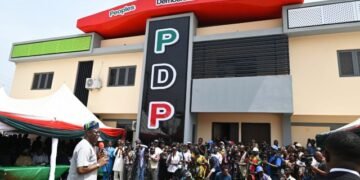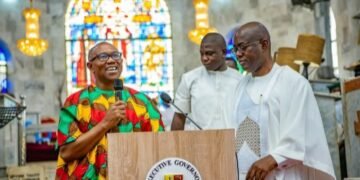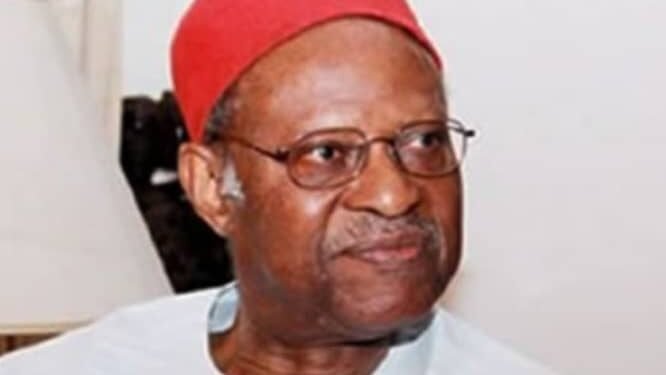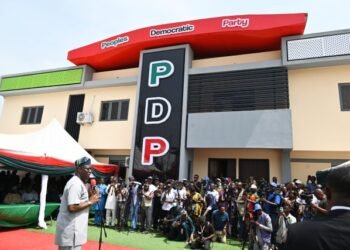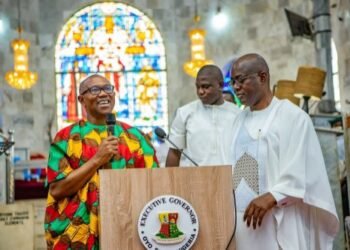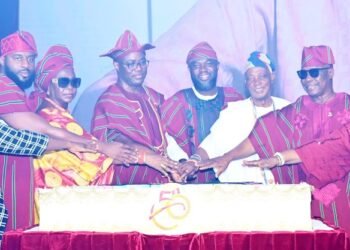Chief Emeka Anyaoku, former Secretary-General of the Commonwealth, has inaugurated a committee to coordinate efforts at writing a new democratic constitution for Nigeria.
The committee, inaugurated at The Patriots Secretariat in Lagos on Thursday and made up of former governors and other prominent Nigerians, sought to coordinate a forthcoming national summit on constitutional democracy for the country.
Members of the committee included former Governors Gbenga Daniel and Aminu Tambuwal, who will both serve as co-chairmen.
Also on the team were former Governor Donald Duke, Boni Haruna, and Kayode Fayemi; former Minister of Information, Labaran Maku; economist and political activist, Professor Pat Utomi; Senator Shehu Sani; and Dr. Tokunbo Awolowo-Dosumu, among others.
The committee was mandated to coordinate a national summit scheduled for May 28 and 29, aimed at galvanising national consensus for replacing the 1999 Constitution with a new people’s democratic constitution.
Anyaoku, who leads The Patriots, stated at the inauguration that amending the 1999 Constitution would no longer suffice to address Nigeria’s worsening insecurity, economic stagnation, poverty, and national disunity.
He said: “Nigeria is a pluralistic state where the importance of the constitution is overriding. We should have a constitution that enables our pluralistic state to evolve into a progressive nation, which we have not yet become.
“The 1999 Constitution, however amended it can be, will not serve this country well. This is because experience all over the world has shown that for pluralistic countries to survive as individual political entities, they have had to have truly federal constitutions.”
The respected elder statesman and diplomat insisted that the 1999 Constitution, inherited from the military era, lacked legitimacy and fails to reflect the will of the people.
Anyaoku strongly warned that, unless Nigeria adopted a structure that ensures equity and regional autonomy, the country risked further decline.
According to him, the 1960–1966 Federal Constitution offered a more workable framework for Nigeria’s diversity and should serve as a blueprint for the current push.
“The sort of constitution that we had at the beginning of our independence from 1960 to January 1966, when the military stepped in, was a fairly, truly federal constitution,” he said.
He said the current Nigerian Constitution does not permit separation of states and local government areas, warning that Nigeria risked break up without federal reforms and a democratic constitution.
“Then, we didn’t have the sort of challenges we have at the moment. The challenge of widespread insecurity throughout the country; the challenge of an underperforming economy, which breeds massive poverty and youth unemployment; and the challenge of declining Nigeria’s standing among the committee of nations.
“We believe that a new constitution will help Nigeria to tackle these challenges and, above all, will help Nigeria to transform from being a country, which some people have described as mere geographical expression, to becoming a nation, becoming a Nigerian Nation,” he stated.
The Anyaoku-led Patriots has consistently advocated for the replacement of the 1999 Constitution, which they describe as flawed and unrepresentative, with a new democratic constitution.
The group also urged President Bola Tinubu to convene a Constituent Assembly, where Nigerians can collectively negotiate a new democratic constitution that would reflect the true aspirations of the people.
In line with this objective, the summit—tagged “Constitutional Democracy That Works for All in Nigeria”—will deliberate on wide-ranging reforms including restructuring, true federalism, rotational presidency, tenure of elected officials, and the choice between the presidential and parliamentary systems.
The gathering will also revisit recommendations from the 2014 National Conference and draw lessons from the 1963, 1979, 1989, and 1993 constitutional frameworks.
Prominent figures scheduled to deliver keynote addresses included Nobel Laureate Professor Wole Soyinka; former Chairman, Independent National Electoral Commission (INEC), Professor Attahiru Jega; elder statesmen General T.Y. Danjuma (rtd.); Professor Ango Abdullahi; General Ike Nwachukwu (rtd.); and General Alani Akinrinade (rtd.).
Others expected to speak included Dr Olisa Agbakoba (SAN), Chief Wole Olanipekun (SAN), Senator Femi Okurounmu, Dr Oby Ezekwesili, Dr Usman Bugaje, Dr Jibrin Ibrahim, and Mr Clement Nwankwo.
The summit’s resolutions will be drafted by a panel of legal and governance experts, including Mike Ozekhome (SAN), Dr. Akin Fapohunda, Dr. Hauwa Mustapha and Dr. Bilikisu Magoro.

